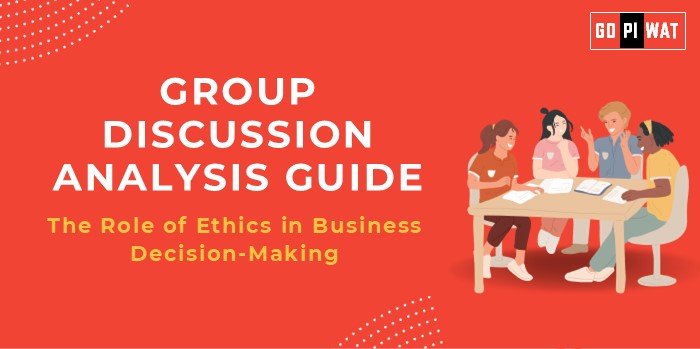📋 Group Discussion (GD) Analysis Guide: The Role of Ethics in Business Decision-Making
🌐 Introduction to the Role of Ethics in Business Decision-Making
Opening Context: “In today’s interconnected world, ethics in business decision-making is not just a moral obligation but a strategic imperative that shapes public trust and long-term success.”
Topic Background: Ethical decision-making in business ensures adherence to societal values, legal norms, and sustainability. Recent corporate scandals like those involving data breaches and environmental violations highlight the importance of integrating ethics into decision-making frameworks.
📊 Quick Facts and Key Statistics
- 💰 CSR Spending: Over $20 billion annually by Fortune 500 companies indicates growing emphasis on ethical practices.
- 🌟 Consumer Trust: 83% of consumers prefer brands with a positive ethical track record (Source: Edelman Trust Barometer 2023).
- 📈 Whistleblower Reports: Ethical breaches have risen by 12% globally, emphasizing the need for stringent oversight (Source: KPMG, 2023).
- 🌍 Sustainability Investments: ESG investments totaled $8 trillion in 2023, reflecting growing corporate commitment.
🤝 Stakeholders and Their Roles
- 🏛️ Governments: Enforcing regulations and fostering ethical governance through frameworks like the UN Global Compact.
- 📊 Corporates: Establishing ethical policies, CSR programs, and compliance systems.
- 👥 Consumers: Advocating for transparency and ethical accountability in products and services.
- 🌱 NGOs: Monitoring corporate behavior and promoting social and environmental justice.
🏆 Achievements and Challenges
✨ Achievements
- 🌿 Increased ESG Integration: Major companies now tie executive compensation to ESG metrics.
- 🛒 Ethical Supply Chains: Brands like Patagonia champion transparency and sustainable sourcing.
- 📢 Enhanced Consumer Awareness: Campaigns like “Fairtrade Certified” promote ethical consumption.
⚠️ Challenges
- 🟢 Greenwashing: Misleading claims about ethical practices.
- 🌍 Global Supply Chain Complexities: Difficulty in enforcing ethical standards across borders.
- ⚖️ Ethical Dilemmas: Balancing profitability with ethical imperatives.
📄 Structured Arguments for Discussion
- ✅ Supporting Stance: “Ethical decision-making strengthens brand loyalty and fosters sustainable growth.”
- ❌ Opposing Stance: “Strict adherence to ethics may conflict with shareholder profit expectations.”
- ⚖️ Balanced Perspective: “Ethics in decision-making creates long-term value despite short-term challenges.”
🎯 Effective Discussion Approaches
- Opening Approaches:
- 📊 “With consumer trust in ethical brands at 83%, how can businesses afford to ignore ethics?”
- 📈 “The rise in whistleblower reports highlights the critical need for ethical frameworks.”
- Counter-Argument Handling:
- ✅ “While ethical practices may increase costs initially, they reduce reputational risks long-term.”
📊 Strategic Analysis of Strengths and Weaknesses
- 💪 Strengths: Builds trust, ensures compliance, drives sustainable innovation.
- 📉 Weaknesses: May lead to higher operational costs, slower decision-making processes.
- 🚀 Opportunities: Leveraging ethics for brand differentiation and competitive advantage.
- ⚡ Threats: Risk of non-compliance penalties and reputational damage.
📈 Connecting with B-School Applications
- 🌍 Real-World Applications: Explore CSR strategies, sustainability metrics, or business ethics case studies in MBA projects.
- 🗣️ Sample Interview Questions:
- 💬 “How should businesses balance profitability and ethical responsibilities?”
- ⚖️ “Discuss a case where ethical practices directly impacted a company’s financial success.”
- 🎓 Insights for B-School Students:
- Use ethics as a framework for strategic decisions.
- Analyze ethical dilemmas in coursework and internships.


